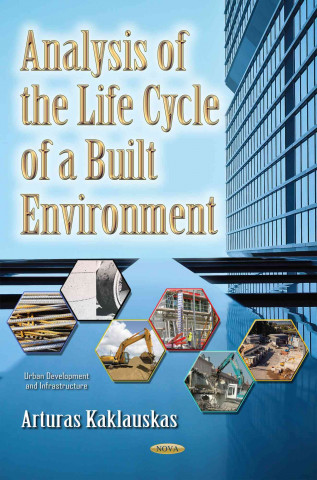
Kód: 14262939
Analysis of the Life Cycle of a Built Environment
Autor Kaklauskas, Dr Arturas, PhD
A thorough description of a built environments life cycle (brief; design; raw material extraction, transport and processing; construction materials production and distribution; construction; use, repair and maintenance; demolition ... celý popis
- Jazyk:
 Angličtina
Angličtina - Vazba: Pevná
- Počet stran: 270
Nakladatelství: Nova Science Publishers Inc, 2016
- Více informací o knize

Mohlo by se vám také líbit
-

Dune
216 Kč -

Haunting Adeline
621 Kč -

Berserk Deluxe Volume 2
1092 Kč -

White Nights
89 Kč -

Powerless
268 Kč -

Atomic Habits
330 Kč -

Dune Messiah
228 Kč -

Berserk Deluxe Volume 3
1142 Kč -

One Day
221 Kč -

Berserk Deluxe Volume 1
1115 Kč -

Iron Flame
368 Kč -

Surrounded by Idiots
213 Kč -

Harry Potter and the Prisoner of Azkaban (Minalima Edition)
993 Kč -

Gravity Falls Journal 3
443 Kč -

Heaven Official's Blessing: Tian Guan Ci Fu (Novel) Vol. 1
420 Kč -

The Creative Act
568 Kč -

Dune
276 Kč -

Hunting Adeline
624 Kč -

A Little Life
290 Kč -

Children of Dune
230 Kč -

Heaven Official's Blessing: Tian Guan Ci Fu (Novel) Vol. 2
427 Kč
Informovat o naskladnění knihy
Zadejte do formuláře e-mailovou adresu a jakmile knihu naskladníme, zašleme vám o tom zprávu. Pohlídáme vše za vás.
Více informací o knize Analysis of the Life Cycle of a Built Environment
 Anotace knihy
Anotace knihy
A thorough description of a built environments life cycle (brief; design; raw material extraction, transport and processing; construction materials production and distribution; construction; use, repair and maintenance; demolition and disposal, reuse, or recycling analysis) is difficult to procure. A building and its environment comprise a complex system based on its technical, technological, economical, social, cultural, ecological and other aspects. All sub-systems influence the total efficiency performance. The interdependence between subsystems also plays a significant role. This monographs research objective is the life cycle of a built environment along with its interested parties striving to attain their goals in the micro-, meso- and macro-environments that make an integral whole. Comprehensive research of this required development of new methods for the multiple criteria analysis of a project that would enable a user to assess its quantitative and qualitative aspects thoroughly. The diversity of the factors under assessment corresponds to various ways for presenting data needed for decision making. Various researches on the life cycle of a built environment and/or its composite parts at micro-, meso- and macro-levels are under global development. Such researches analyze energetic, technical, technological, economic, legal/regulatory, innovative and microclimatic aspects. However, they ignore the social, cultural, ethical, psychological, emotional, religious and ethnic aspects of a built environments life cycle. It is notable that not one researcher from different countries analyzed the life cycle of a built environment and its stages in the way the authors of this investigation have considered them. Here, the authors also involve the stakeholders in the life cycle as well as the micro-, meso- and macro-environments that have particular impact on making an integral whole. This monograph contains detailed revisions of the research along with theoretical and practical tasks for analyzing the life cycle of a built environment and includes presentations of distinctive examples. The concept of a modern life cycle of a built environment as a model is discussed. The theoretical and practical analyses presented in this monograph verify that intelligent decision support systems allow different stakeholders to achieve improved work quality results and productivity. An organized creative team of interested groups can produce a life cycle of a built environment that considers qualitative societal aspects to a greater degree. Realistically, most of a built environment life cycle will have both positive and negative features. The mission is to arrive at an equilibrium of pros and cons to optimize the life cycle of a built environment by a system of qualitative and quantitative criteria. Integration of intelligent decision support systems in the life cycle of a built environment is undoubtedly one step in the right direction. Here, the knowledge relevant to the development of a built environment life cycle appears by its economic, legal, technological, technical, organizational, social, cultural, ethical, psychological, emotional, religious and environmental terms, as well as its managerial implications. References to the most modern sources of scientific literature worldwide are also included. The readers targeted for this monograph include researchers, MSc and PhD civil engineering students and parties involved in construction management and real estate development. Additionally, the book could be useful for other scholars along with MSc and PhD students of economics, management and other areas of expertise.
 Parametry knihy
Parametry knihy
Zařazení knihy Knihy v angličtině The arts Architecture Theory of architecture
- Plný název: Analysis of the Life Cycle of a Built Environment
- Autor: Kaklauskas, Dr Arturas, PhD
- Jazyk:
 Angličtina
Angličtina - Vazba: Pevná
- Počet stran: 270
- EAN: 9781634855006
- ISBN: 1634855000
- ID: 14262939
- Nakladatelství: Nova Science Publishers Inc
- Hmotnost: 662 g
- Rozměry: 186 × 260 × 21 mm
- Datum vydání: 01. September 2016
Osobní odběr Praha, Brno a 12903 dalších
Copyright ©2008-24 nejlevnejsi-knihy.cz Všechna práva vyhrazenaSoukromíCookies



 Vrácení do měsíce
Vrácení do měsíce 571 999 099 (8-15.30h)
571 999 099 (8-15.30h)